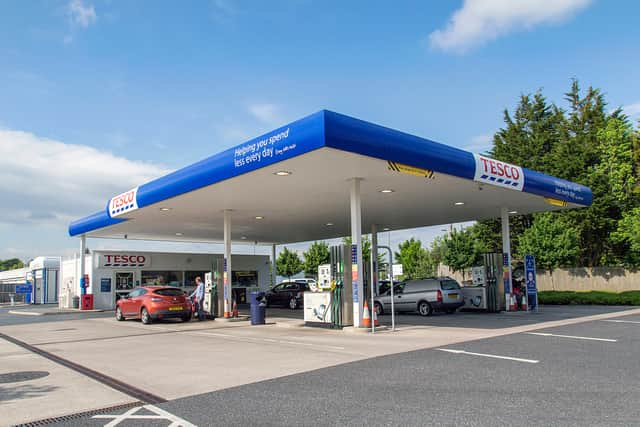Supermarket bosses back 'transparent' fuel price tracker to improve value for drivers
and live on Freeview channel 276
Supermarket bosses have welcomed calls for more transparency on fuel prices amid accusations that they are profiting from a lack of competition.
Senior executives from the UK’s four largest chains all agreed that a fuel price tracker which made it easier for drivers to compare costs at different filling stations would be welcome and said they would be happy to contribute to such a system.
Advertisement
Hide AdAdvertisement
Hide AdThe figures from Tesco, Asda, Sainsbury’s and Morrisons were giving evidence to the Business and Trade Committee amid claims that they were profiteering and had doubled their margins on petrol and diesel in the last four years.
In Northern Ireland fuel retailers, including the major supermarkets, submit weekly details of their regional petrol and diesel prices to a publicly accessible database. Committee members suggested to the executives that the tracker was part of the reason that prices are between 8p and 10p cheaper than in other parts of the UK.
Tesco’s commercial director, Gordon Gafa, conceded that such a method of comparing costs might be partly behind the lower prices and said his company would welcome a similar system around Britain. He said that increased digitalisation of data, including price tracking was key to consumers getting the best deal.
Sainsbury’s food commercial director, Rhian Bartlett, said the chain was also “very supportive” of any price tracking system, including apps which would allow drivers to see price differences and the driving time and cost of travelling to different locations.
Advertisement
Hide AdAdvertisement
Hide AdTheir counterparts at Asda and Morrisons also said they were supportive of any tracking system that would give consumers a better deal.
It was reported earlier this year that Chancellor Jeremy Hunt had asked civil servants to investigate the concept of a fuel price tracker similar to that in place in Northern Ireland. It was also suggested that it should go further and copy French and German systems which offer real-time station-by-station pricing information.


RAC fuel spokesman Simon Williams said: “While all four supermarket bosses said they would support a Northern Ireland-style online fuel price checker, we know this isn’t the answer to giving all drivers fairer prices at the pumps, particularly as prices are only updated on it once a week and drivers can’t see which forecourts are cheapest.
“Ultimately, it comes down to how much margin retailers want to make per litre and, as the Competition and Markets Authority [CMA] has already stated, supermarket fuel margins have increased significantly since 2019.”
Advertisement
Hide AdAdvertisement
Hide AdThe executives were questioned over their fuel pricing policies and profit margins after the competition watchdog raised concerns around supermarkets’ role in keeping prices artificially high.
MPs asked the representatives whether they had stopped competing on petrol and diesel prices and why their prices remained high. All four blamed market volatility caused by external factors, including the war in Ukraine, for soaring prices and pointed out that prices had fallen back significantly since the start of the year.
However, they refused to be drawn on accusations that at least one chain had deliberately targeted fuel margins as a way to extend their profits, and figures from the CMA that show supermarket fuel margins have grown from less than 4% in 2018 to almost 8% in 2022.
Only David Potts, CEO of Morrisons, conceded that there was “a bit more profit” in fuel than historically while his counterparts from the other chains refused to comment.
Advertisement
Hide AdAdvertisement
Hide AdWilliams added: “When the wholesale price of diesel fell this spring, we saw average retailer margin reach 22p a litre which was more than three times the long-term margin of 7p. This cannot be allowed to continue when households are having to contend with a cost-of-living crisis. We believe the biggest retailers that sell the most fuel should be compelled to charge a reasonable margin per litre.”
Comment Guidelines
National World encourages reader discussion on our stories. User feedback, insights and back-and-forth exchanges add a rich layer of context to reporting. Please review our Community Guidelines before commenting.
